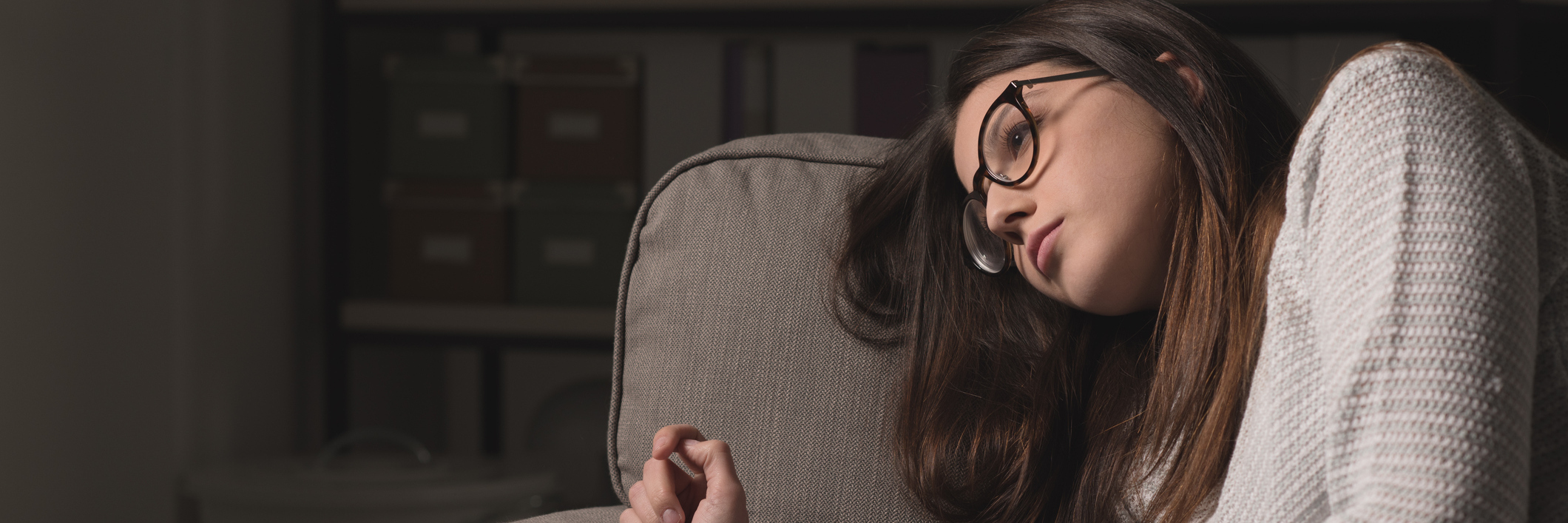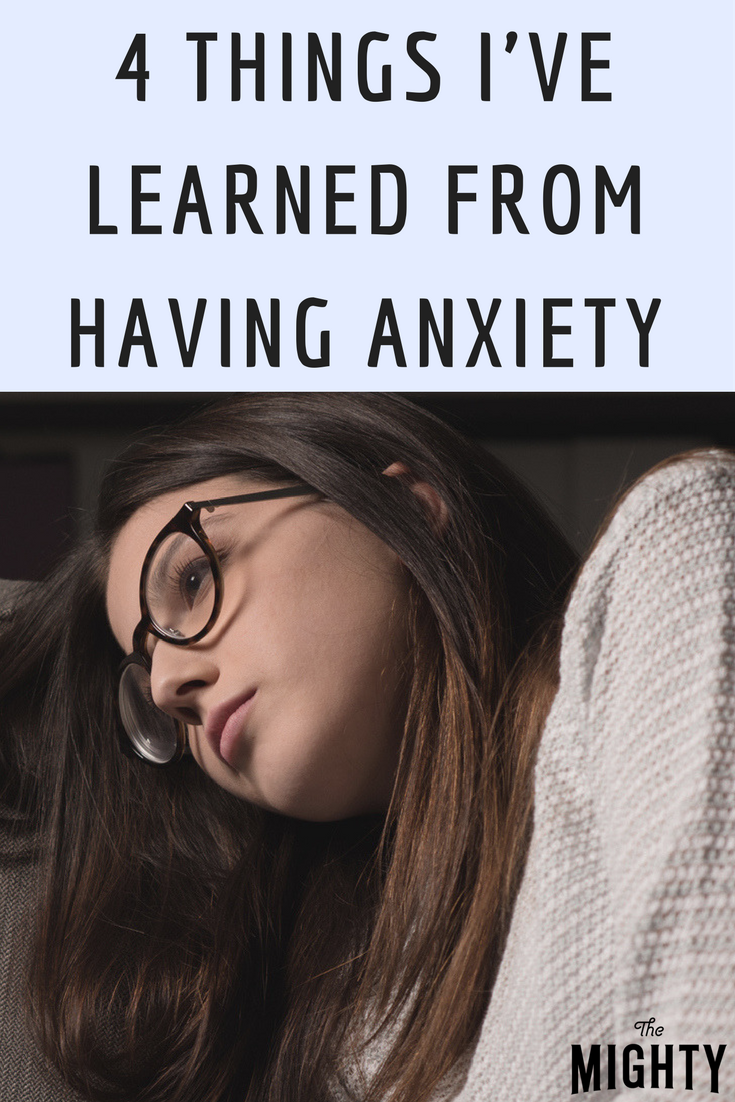Intrusive thoughts. Excessive worrying. Dizziness. A racing heart.
I’ve lived with the effects of anxiety for so long that these kinds of symptoms seem almost normal to me. I can still remember sitting at my desk in elementary school, my little hands sweating and twisting against each other as a feeling of doom would nearly send me running from the classroom.
Many years have passed since then, but anxiety has remained a constant in my life. It’s an annoying pest that likes to tap on my shoulder to remind me it’s there – often at the worst possible times, like during a family function or a trip to the doctor’s office.
Since being diagnosed with anxiety and panic attacks a decade ago, I’ve had many highs and lows. In recent years, however, I’ve managed to keep anxiety from running my life. Don’t be fooled; I definitely don’t have it all figured out, and I still have issues with anxiety and panic more often than I would like. But I don’t feel like it owns me anymore. That’s such a good thing to remember, especially during the darkest of times.
After many years of dealing with this mental disorder, I’ve had the following realizations.
1. Anxiety can literally make you sick.
Over the years, I can’t tell you how many times I’ve gone to my primary doctor or ended up at the ER over what turned out to be anxiety or panic attacks. I’ve had blood tests, brain scans, chest x-rays, neurological assessments, heart monitors… you get the picture.
And the results of every test? Normal.
I lost a lot of sleep waiting to find out if I had some horrible illness, which of course only fed my anxiety. Headaches, stomachaches, fatigue, tingling in my fingers, tongue numbness – these are all symptoms I’ve dealt with to some degree in the last several years.
The only things that have helped reduce these problems have been relaxation methods, counseling, medication and simple awareness that anxiety was the culprit. Still, it’s shocking how much anxiety can terrorize my body in addition to my mind.
2. Anxiety can affect your life’s direction.
I’m a writer. Ever since I was a finalist in a short story contest in elementary school, I’ve always wanted to make playing with words the focal point of my career. I guess you could say I’ve been lucky to have the same interest for so long, but that doesn’t mean writing is all I’ve ever wanted to do. I’ve been drawn to careers in health care and social work too. I even have a degree in public health, which I greatly enjoyed earning.
Yet working in a medical environment or human services setting frightened me. These occupations have strict rules to adhere to, and mistakes have the potential to do great harm to other people. It just seemed to be too much pressure for me to handle, so I didn’t pursue jobs in these fields. There was just too many unknowns from my perspective, whereas writing was something familiar and comforting.
So, I let my anxiety triggers impact what I chose to do professionally. Do I regret being a writer? Of course not. But I do wonder in what other directions I could have gone if I had not let anxiety and fear rule me in the past.
3. Not opening up often makes the impact of anxiety worse.
Each person who has anxiety deals with it uniquely. That said, I think there is often a feeling we need to hide our anxiety. We don’t want to make other people uncomfortable. We’re afraid we will be labeled as weird. We don’t want to seem unprofessional or hysterical. I get it. No one wants to have a breakdown at a business meeting or in a restaurant, but I know firsthand that trying to hold anxiety and panic in can be so damaging — in more ways than one.
When I was a teenager, I had family members who told me it was “stupid” and “weak” to have anxiety and depression. I learned pretty quickly I had to paint a smile on in order to keep the peace.
Needless to say, this ended badly.
I developed insomnia and low self-esteem, and I didn’t care about how I looked. I constantly had headaches. I’d skip meals all day, then binge at night out of extreme hunger. I was lonely and broken, and it took years for me to get out of the destructive patterns I developed all because I was afraid to show my truth.
Not everyone was supportive of me when I was younger, and it made for a really damaging time in my life that I still feel the repercussions of today. However, looking back, there were folks I could have turned to for help. Who knows? I may have been much better off — and gotten a handle on my anxiety sooner — if I had been willing to open up to one or two trustworthy people rather than let a few individuals silence me.
4. It’s not always worth it to try to make others understand your anxiety disorder.
I’m absolutely in favor of identifying relatives, friends or other trustworthy folks who you feel comfortable opening up to about your fears and anxieties. For me, sharing my feelings and experiences with my best friend and a counselor was instrumental in helping manage my anxiety. Never underestimate the power of having a shoulder to cry on or someone who will let you vent in a nonjudgmental, caring way.
That said, it’s definitely worth figuring out who isn’t the right person to go to when you’re having a bad day. Some people in my life, no matter how much information I’ve given them or how many times I’ve tried to open up to them, continue to see mental conditions as either insignificant or signs of weakness. There have also been a few individuals who have shared my private thoughts to others without my permission. Some people just aren’t good at handling emotional discussions.
It takes a lot of courage to share your deepest feelings and thoughts to other people. It was profoundly hurtful to keep putting myself out there and having others scoff at or ignore what I was experiencing. There can be a temptation to keep trying and trying. “Maybe this will be the time that makes him understand. If I tell her that, maybe she’ll care.” It’s not impossible to open up people’s eyes to what having an anxiety disorder is like, but I found that if I’m getting harmed by someone’s reaction over and over again, it’s not worth the strain to keep trying to convince him or her of my truth.
I’m not telling you to cut these people out of your life. Those kinds of decisions are deeply personal. However, you may want to limit how much, if anything, you tell them about your struggles with anxiety. If you don’t have any loved one or friend you can go to for support, consider meeting with a mental health professional instead.
Our minds — and bodies — aren’t meant to hold in all the chaos anxiety creates, so it’s vital to find ways to keep it from navigating your path through life.
We want to hear your story. Become a Mighty contributor here.
Thinkstock photo via cyano66


